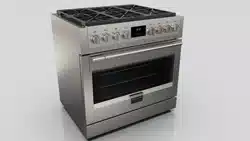Loading ...
Loading ...
Loading ...

EN
10
6 - General Oven Tips
Preheating the Oven
• Preheat the oven when using the Bake, Convection Bake
and Broil modes.
• Selecting a higher temperature does not shorten the preheat
time.
• Preheating is necessary for good results when baking cakes,
cookies, pastry and breads.
• Preheating will help to sear roasts and seal in meat juices.
• Place oven racks in their proper position before preheating.
• There is no light or chime indication that the oven has
reached the set temperature.
Estimated Preheating Time for Range 36’’
°F °C MIN:SEC
250 ~ 120 2:30
325 ~ 165 4:00
375 ~ 190 5:00
425 ~ 220 7:00
475 ~ 245 9:00
550 ~ 290 11:30
Estimated Preheating Time for Range 30’’
°F °C MIN:SEC
250 ~ 120 2:30
325 ~ 165 3:30
375 ~ 190 4:30
425 ~ 220 5:30
475 ~ 245 7:00
550 ~ 290 11:00
Operational Suggestions
• Do not set pans on the open oven door.
• Use the interior oven lights to view the food through the
oven door window rather than opening the door frequently.
• You can set the minute timer using the preheat timing chart
above to let you know when the oven is preheated to the
set temperature.
Utensils
• Glass baking dishes absorb heat. Reduce oven temperature
25°F (15°C) when baking in glass.
• Use pans that give the desired browning. The type of finish
on the pan will help determine the amount of browning that
will occur.
• Shiny, smooth metal or light non-stick / anodized pans
reflect heat, resulting in lighter, more delicate browning.
Cakes and cookies require this type of cookware.
• Dark, rough or dull pans will absorb heat resulting in a
browner, crisper crust. Use this type for pies.
• For brown, crisp crusts, use dark non-stick / anodized
or dark, dull metal utensils or glass bake ware. Insulated
baking pans may increase the length of cooking time.
• Do not cook with the empty broiler pan in the oven, as
this could change cooking performance. Store the broil pan
outside of the oven.
Oven Condensation and Temperature
• It is normal for a certain amount of moisture to evaporate
from the food during any cooking process. The amount
depends on the moisture content of the food. The moisture
may condense on any surface cooler than the inside of the
oven, such as the control panel.
High Altitude Baking
• When cooking at high altitude, recipes and cooking time
will vary from the standard.
Oven Racks
• The oven has rack guides at six levels as shown in the
illustration on Page 6.
• Rack positions are numbered from the bottom rack guide
(#1) to the top (#6).
• Each level guide consists of paired supports formed in the
walls on each side of the oven cavity.
• Always be sure to position the oven racks before turning
on the oven. Make sure that the racks are level and secure
once they are in position.
Please refer to illustration on Page 6 if there is any question
as to which side is the front of the rack.
• The racks are designed to stop when pulled forward to their
limit.
CAUTION
Never use aluminum foil to cover the oven racks or to line
the oven. It can cause damage to the oven liner if heat is
trapped under the foil.
CAUTION
Make sure you do not force it to avoid damage to the
enamel.
To remove oven rack from the oven:
1. Pull rack forward
Loading ...
Loading ...
Loading ...
